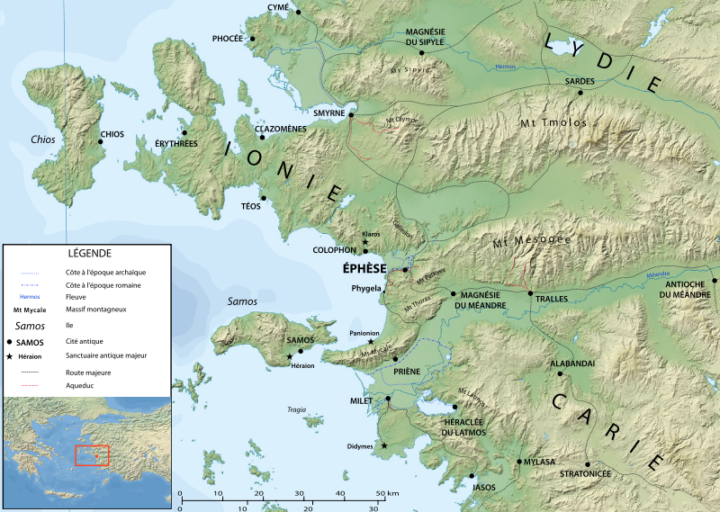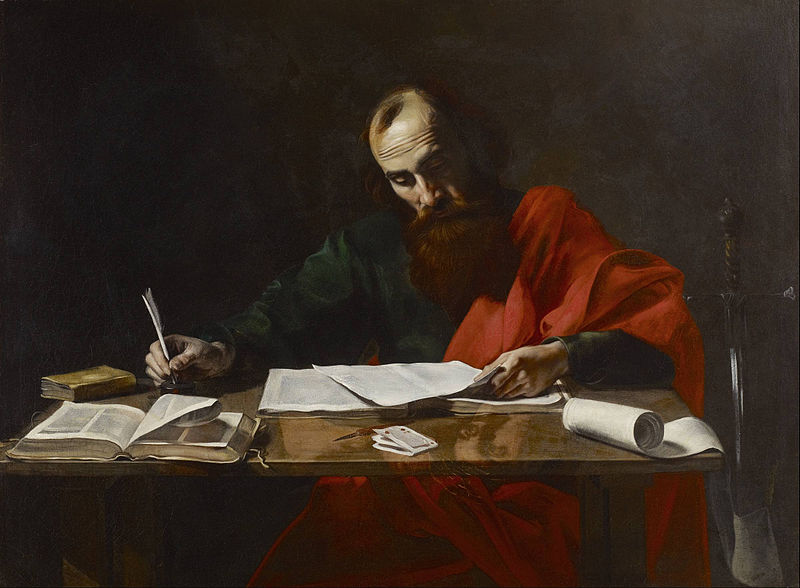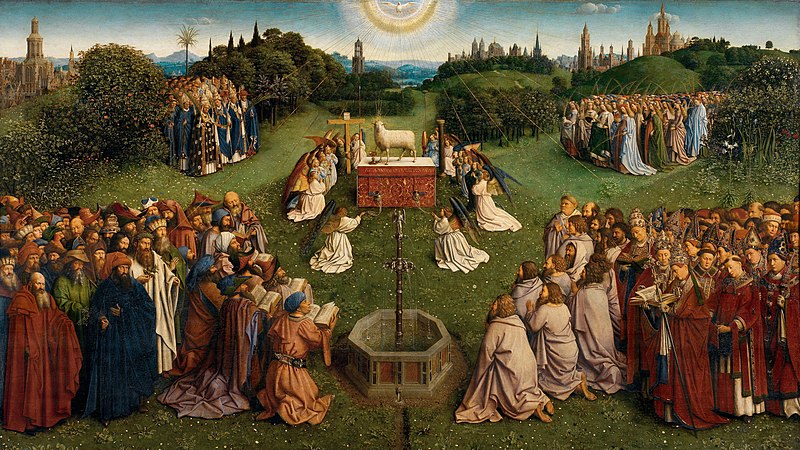私は先週のこのエッセイを、「教会が主の宣教のために存在すると考えるのは間違いだ」と言って締めくくった。具体的には、「これは教会の非聖書的な見方だ。そして、教会にとって不健康なダイエットをしているようだと私は思う」と述べた。その最初のポイントを理解するために、私の聖書の見解に基づき、エフェソ書を見ることから始めよう。エフェソ書は教会の体系的な神学ではないが、パウロが教会の神学を最も深く、一貫して説明しているからだ。
[toggle]Last week, I ended last week’s Elusive Presence essay by saying that thinking of the church primarily in missional terms is a mistake. Specifically, I said, “I believe it is an unbiblical view of the church. And I believe it is an unhealthy diet for the church.” To grasp that first point, I will begin by looking at Paul’s letter to the Ephesians to ground my biblical exposition. While Ephesians it is not a systematic theology of the church, Ephesians is where Paul outlines most deeply and consistently a theology of the church. [/toggle]
「教会の役割こそ中心だ」という歴史的に息をのむような見方を説明することによって、パウロはこの手紙を書き始める。
[toggle]Paul begins his letter with hardly any warm up; he jumps in by outlining a breathtaking view of history, in which the role of the church is central: [/toggle]わたしたちの主イエス・キリストの父である神は、ほめたたえられますように。
[toggle]Blessed be the God and Father of our Lord Jesus Christ, who has blessed us in Christ with every spiritual blessing in the heavenly places, just as he chose us in Christ before the foundation of the world to be holy and blameless before him in love. He destined us for adoption as his children through Jesus Christ, according to the good pleasure of his will, to the praise of his glorious grace that he freely bestowed on us in the Beloved. In him we have redemption through his blood, the forgiveness of our trespasses, according to the riches of his grace that he lavished on us. With all wisdom and insight he has made known to us the mystery of his will, according to his good pleasure that he set forth in Christ, as a plan for the fullness of time, to gather up all things in him, things in heaven and things on earth” (Eph. 1:3-10, NRSV). [/toggle]
神は、わたしたちをキリストにおいて、天のあらゆる霊的な祝福で満たしてくださいました。
天地創造の前に、神はわたしたちを愛して、御自分の前で聖なる者、汚れのない者にしようと、キリストにおいてお選びになりました。
イエス・キリストによって神の子にしようと、御心のままに前もってお定めになったのです。
神がその愛する御子によって与えてくださった輝かしい恵みを、わたしたちがたたえるためです。
わたしたちはこの御子において、その血によって贖われ、罪を赦されました。
これは、神の豊かな恵みによるものです。
神はこの恵みをわたしたちの上にあふれさせ、すべての知恵と理解とを与えて、秘められた計画をわたしたちに知らせてくださいました。
これは、前もってキリストにおいてお決めになった神の御心によるものです。
こうして、時が満ちるに及んで、救いの業が完成され、あらゆるものが、頭であるキリストのもとに一つにまとめられます。
天にあるものも地にあるものもキリストのもとに一つにまとめられるのです。(エフェソ1:3~10)
パウロが神の奥義を理解していることに注目しよう。(そのような言葉で言い表すことが許されるのであれば)「天地創造の前」、神の第一の主要な目的は、「愛の中で聖(きよ)く、非難されることなく」、神と共に暮らす人々を創造することだった。パウロはほかの何よりも先に、子なるイエスの兄弟姉妹となる、神の家族として選ばれた人々について考えた。
[toggle]Note Paul’s understanding of the mind of God (if we can talk in such terms) before the creation of the world: “Before the foundation of the world,” he says, God’s first and primary purpose was to create a people for himself, who would live with him “holy and blameless in love.” Before and above anything else, he thought about a people he would adopt as family, who would be brothers and sisters of Jesus his Son. [/toggle]神の家族が外に出て、さらに重要な何かを行うという思惑もなく、パウロはそのように書いた。「自分の意志の喜びに従い」、そして「彼の栄光の恵みを称える」ことを、この行為のシンプルな素晴らしさのゆえに、パウロはそう書いたのだ。パウロにとって、神の家族、すなわち教会は、手段ではなく目的だと思われる。
[toggle]He did this not for some ulterior motive, so that this family would then go out and do something even more important. But he did this “according to the good pleasure of his will,” and “to the praise of his glorious grace”—meaning because of the simple splendidness of the act. It appears that for Paul, the family of God—the church—is not a means but an end. [/toggle]実際に教会は神の普遍的な意志のしるしであり、「天と地のすべてのものを集めるために時が満ちる計画」なのだ。神の願いは、すべてを愛の中にとどめること。その計画は次のようだと思われる。「どこにいようと、目で見ることができる限り、神の家族、すなわち教会は、聖なる愛のうちに父なる神の御前に住む」
[toggle]The church is in fact the sign and portent of God’s universal will, which is “a plan for the fullness of time, to gather up all things in him, things in heaven and on earth.” God’s wish is to bring everything into his orbit of love. The plan seems to be this: Everywhere, as far as the eye can see, there will be the family of God—the church—living before its Father in holy love. [/toggle]パウロは続けてこう述べる。
[toggle]Paul continues: “In Christ we have also obtained an inheritance, having been destined according to the purpose of him who accomplishes all things according to his counsel and will, so that we, who were the first to set our hope on Christ, might live for the praise of his glory” (Eph. 1:11–12). [/toggle]キリストにおいてわたしたちは、御心のままにすべてのことを行われる方の御計画によって前もって定められ、約束されたものの相続者とされました。それは、以前からキリストに希望を置いていたわたしたちが、神の栄光をたたえるためです。(エフェソ1:11~12)

ヴァランタン・ド・ブーローニュ「書簡を書くパウロ」
私たちが教会に招かれた民であることを踏まえ、私たちが何をすべきなのかに注目しよう。宣教的な関心を考えると、「私たちは神の御心に従って運命づけられている。そのため、早くからキリストに望みを置いている私たちが、まだその望みを知らない人々に希望を伝えるために生きてくべきだ」。
[toggle]Notice how he talks about what we do in light of our being called into the church. Given our interest in things missional, we would expect to read this: “We have been destined according to God’s will, so that we who were first to set our hope in Christ, might live to share that hope with those who don’t know hope.” [/toggle]あるいは、「最初からキリストに望みを置いて生きている私たちは、世界の神の国をさらに前進させるために生きるべきだ」。
[toggle]Or “We who were first to set our hope in Christ might live to further the kingdom of God in the world.” [/toggle]または、「私たちは、キリストに希望を見いだした最初の人として、世界をより良い場所にし、人類の繁栄を促進するために生きるべきだ」。
[toggle]Or “We who were the first to set our hope in Christ might live to make the world a better place, to foster human flourishing.” [/toggle]違う。これらはパウロの教会観をまったく反映していない。そうではなく、私たちが教会に集まったのは、最初にキリストに希望をいただいた私たちが「神の栄光を称える」ために生きるためだとパウロは言ったのだ。
[toggle]No. His view of the church is not instrumental at all. Instead, he says that since we have been gathered into the church, we who have first set out hope in Christ should live like this: praising God’s glory. [/toggle]ここでのポイントは、教会とは、神の喜びと私たちの喜びのために創造された最終地であることだ。教会と呼ばれる家族の中に招かれた結果、私たちがすべきことは、聖なる愛の中で一緒に過ごすことにより、また神の栄光を共に賛美することによって、その純粋な美徳に浸ることなのだ。
[toggle]The point is this: church is its own end. It is created by God’s good pleasure and for our good pleasure. As a result of being called into the family called church, our job is to bask in its sheer goodness, by living together in holy love, and by together praising God’s glory for doing such a hilarious thing. [/toggle]この要約によるなら、多くの人が仮定しているように、教会が世界のために造られたとは思えない。どちらかと言えば、世界が教会のために造られたのだ。歴史の漏斗(じょうご)は、教会が贖(あがな)いのために世界へと注がれるということではない。世界、少なくともキリストを信頼するこの世界の人々は、教会へと注がれるということだ。
[toggle]According to this summary passage, it does not appear that the church was created for the world, as many assume. If anything, the world was created for the sake of the church. That is, the funnel of history is not that the church pours itself into the world to redeem it, but the world–as least those in the world who trust in Christ–is poured into the church. [/toggle]パウロはエフェソの信徒に新しい考えを押しつけているわけではいない。彼の神学は旧約聖書に基づいている。イスラエルの民がどのように神によって選ばれ、神によって尊重され、神によって創造され、神の民とされたのかを読むことができる。
[toggle]Paul is not foisting a new idea on the Ephesians. His theology is grounded in the Old Testament. There we repeatedly read how Israel has been chosen by God and esteemed by God, created by God so he might have a people for himself. [/toggle]
ギュスターブ・ドレ「預言者イザヤ」
一つの典型的な例は、主がイザヤを通して語られる聖句だ。
[toggle]One typical example is when the Lord speaks through Isaiah: [/toggle]わたしの僕イスラエルよ。
[toggle]But you, Israel, my servant,
わたしの選んだヤコブよ。
わたしの愛する友アブラハムの末よ。
わたしはあなたを固くとらえ
地の果て、その隅々から呼び出して言った。
あなたはわたしの僕
わたしはあなたを選び、決して見捨てない。(イザヤ41:8~9)
Jacob, whom I have chosen,
the offspring of Abraham, my friend;
you whom I took from the ends of the earth,
and called from its farthest corners,
saying to you, “You are my servant,
I have chosen you and not cast you off” (Is. 41:8-9). [/toggle]
アブラハムは、神の選ばれた人々の父となるように地の果てから呼ばれただけではなく、歴史の目標のしるしになるために(神の恵みにより)父となった。
[toggle]Abraham was not only called from the ends of the earth to be father of God’s chosen people, but the people he fathers (by God’s grace) to become a sign of history’s goal: [/toggle]終わりの日に
[toggle]In days to come
主の神殿の山は、山々の頭として堅く立ち、
どの峰よりも高くそびえる。
国々はこぞって大河のようにそこに向かい
多くの民が来て言う。
「主の山に登り、ヤコブの神の家に行こう。
主はわたしたちに道を示される。
わたしたちはその道を歩もう」と。
主の教えはシオンから
御言葉はエルサレムから出る。(イザヤ2:2~3)
the mountain of the Lord’s house
shall be established as the highest of the mountains,
and shall be raised above the hills;
all the nations shall stream to it.
Many peoples shall come and say,
“Come, let us go up to the mountain of the Lord,
to the house of the God of Jacob;
that he may teach us his ways
and that we may walk in his paths.” (Is. 2:2-3) [/toggle]
言い換えれば、世界はエルサレムに来る。イスラエルは世界を変えるために世界宣教に出ることはないが、歴史の終わりに、神を礼拝し、神から学ぶために世界はシオンに来る。
[toggle]In other words, the world comes to Jerusalem. Israel does not go out to the world missionally to transform the world, but at the end of history, the world comes to Mt. Zion to worship and learn from God. [/toggle]
フーベルト・ファン・エイク「神秘の小羊の礼拝」
このイメージは新約聖書にも書かれている。ヨハネの黙示録に、新しいエルサレムについて読むことができる。
[toggle]This image is repeated in the New Testament. In Revelation we read about the coming down out of heaven a new Jerusalem, about which John says, “I saw no temple in the city, for its temple is the Lord God the Almighty and the Lamb. And the city has no need of sun or moon to shine on it, for the glory of God is its light, and its lamp is the Lamb. The nations will walk by its light, and the kings of the earth will bring their glory into it” (Rev. 21:22-24). [/toggle]わたしは、都の中に神殿を見なかった。全能者である神、主と小羊とが都の神殿だからである。この都には、それを照らす太陽も月も、必要でない。神の栄光が都を照らしており、小羊が都の明かりだからである。諸国の民は、都の光の中を歩き、地上の王たちは、自分たちの栄光を携えて、都に来る。(黙示録21:22~24)
繰り返すが、最後に世界は教会に来る。つまり、神の臨在にひたる場所、神の喜びが私たちの喜びであり、私たちに神を褒め称えることを促す場所に人々が来るということだ。
[toggle]Again, the image is that in the end, the world comes to the church, the place where people bask in the presence of God, where the pleasure of God is our pleasure, prompting us to erupt in praise: “Nothing accursed will be found there anymore. But the throne of God and of the Lamb will be in it, and his servants will worship him” (22:3). [/toggle]もはや、呪われるものは何一つない。神と小羊の玉座が都にあって、神の僕たちは神を礼拝し……(黙示録22:3)
同じ黙示録の前のほうの章で、生き生きとした礼拝の描写がある。
[toggle]A vivid description of that worship is found earlier: [/toggle]玉座に座っておられ、世々限りなく生きておられる方に、これらの生き物が、栄光と誉れをたたえて感謝をささげると、二十四人の長老は、玉座に着いておられる方の前にひれ伏して、世々限りなく生きておられる方を礼拝し、自分たちの冠を玉座の前に投げ出して言った。「主よ、わたしたちの神よ、あなたこそ、栄光と誉れと力とを受けるにふさわしい方。あなたは万物を造られ、御心によって万物は存在し、また創造されたからです」(黙示録4:9~11)
[toggle]And whenever the living creatures give glory and honor and thanks to the one who is seated on the throne, who lives forever and ever, the twenty-four elders fall before the one who is seated on the throne and worship the one who lives forever and ever; they cast their crowns before the throne, singing,
“You are worthy, our Lord and God,
to receive glory and honor and power…” (4:9-11). [/toggle]
聖書を一気に読んだ私の解釈によると、教会、すなわち神の家族の目的は、世界をより良い場所にすることではなく、より良い場所、教会と呼ばれる場所に世界を招待することなのだ。(後編に続く)
[toggle]My reading of the sweep of the biblical picture, then, is that the purpose of the church—the family of God—is not to make the world a better place, but to invite the world into the better place, the place called church. [/toggle]